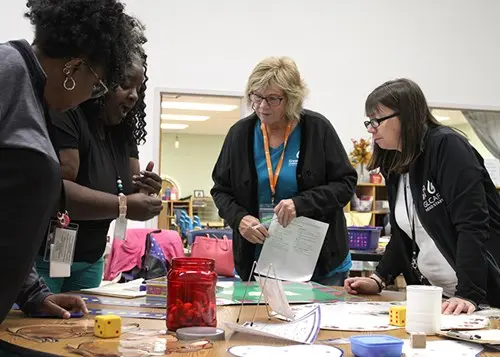Teacher coaching—A team effort

One of Jen Lee’s favorite quotes on coaching comes from someone who’s name is synonymous with the profession — Tom Landry, the late Dallas Cowboys coach whose career spanned three decades:
“A coach is someone who tells you what you don’t want to hear so that you can see what you don’t want to see so that you can be what you’ve always wanted to be.”
Lee and her team don’t work on a football field, but their workplace is every bit as exciting, filled with challenges to overcome and victories to celebrate. Lee, a quality teaching specialist for Great Lakes Community Action Partnership (GLCAP), works among staff who inhabit unique positions in Head Start programs—teacher coaches.
Currently, 16 teacher coaches serve GLCAP’s direct-operated centers, childcare partner centers, and family childcare locations. Lee oversees seven coaches at GLCAP’s direct-operated sites. One of these coaches, Jo Simms, worked for 41 years as a Head Start teacher for GLCAP. Now, as a teacher coach, Simms guides teachers at GLCAP’s Stricker Family Development Center in Fremont through different challenges they may face throughout the day.
One example, Simms related, is how to help teachers encourage children to take on roles that add to their sense of accomplishment and self-worth.
“Maybe being the scheduler—letting the other children know what is coming next in the daily routine. Attendance taker—right along with the teacher and clipboard in hand, checking off the children’s pictures and names on the chart. Providing added jobs and duties allows the child to have something to do, but most importantly, a sense of belonging and acceptance.”

Throughout GLCAP’s Head Start programs, teacher coaches like Jo help teachers solve these day-to-day challenges. Broadly speaking, teacher coaches help teachers implement Head Start curriculum that prepares children for kindergarten. Teacher coaches may lead sessions on particular topics, such as a recent training on school readiness goals for mathematics, in which coaches demonstrated recipe-making and other hands-on activities that may be used to teach children math concepts.
Lee said that since classes have been underway for about two months, teachers have conducted a self-assessment to identify areas in which they would like to improve. The assessment also helps teacher coaches address common concerns shared among teaching staff. Now, for instance, many preschool-aged children who grew up during Covid-era lockdowns did not have the opportunities for socialization that would have been typical in any other time.
“There are a lot of children who weren’t exposed to socialization during COVID, so there are some behaviors that teachers are facing the classroom,” Lee said.
Teacher coaches help teachers develop strategies for managing these behaviors, while also bringing an outside lens that lets teachers recognize moments of success in the classroom.
“A lot of teachers might be getting overwhelmed and are not able to see those light-bulb moments that are happening with students because they’re focused in on those big behaviors,” Lee said. “Teachers might be getting overwhelmed, so one of the things that the coaches have been conscious about is to let teachers know what they’re doing well. It’s helpful to give them perspective and put the joy back into what they’re doing.”
Lee added that teacher coaches often attend trainings, do research, and discover answers for classroom-specific questions that teachers may be facing.
“A teacher may not have the time to do the research, but the coach can help figure it out,” Lee said.
In addition to offering trainings, teacher coaches facilitate support groups for new teachers, including those who are new to the profession or new to GLCAP’s Head Start services. Support groups meet more frequently during the beginning of each school year to help new teachers transition into their roles.
Mainly, it is the everyday support where teacher coaches often make the most impact on fellow staff. Teacher coaches visit classrooms frequently, building rapport with staff to let teachers know coaches are there to help. Teacher Coach Annette Tille relayed one example.
“A teacher came to me who was experiencing some difficulties with transitioning children between activities,” Tille said. “Together we looked at the schedule to see if some transitions could be eliminated. Then we looked for ways to use the transitions as moments of learning by incorporating songs and games during those challenging times.”
Not all answers are easy to recognize. Before working as a teacher coach, Jo Simms was a Head Start teacher with 41 years of classroom experience. Even with this background, Simms said there are still challenges and problems to solve in every classroom. And, as a teacher coach, she tells her colleagues that not having an immediate answer is okay.
“I let the teachers at Stricker know that I may not know an answer for some of their questions, but I will gladly find one for them,” Simms said.
When those answers do come, success is shared by all.
“Seeing a teacher put a suggestion you’ve given into practice and having it be successful is definitely the most rewarding part of being a coach,” Tille added. “As well as seeing the growth a teacher makes.”
